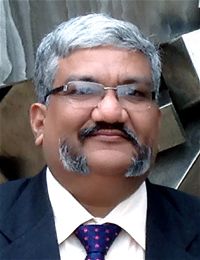Welcome

Welcome to the Department of Mechanical Engineering at IIT Kanpur. We started our journey in the year of 1960. Over the last six decades, we have grown our expertise and competence in the core Mechanical Engineering curriculum and research....
- Read More
-Prof. Ashish Dutta
Head, Department of Mechanical Engineering
Syllabus:Introduction to analytical tools for modeling, analysis and design of railway vehicles...
Credits:9
Syllabus:Fundamentals of machining, Mechanics of metal cutting, Thermomechanical analysis, Chip formation, Basic tribo-interaction in machining, Governing factors at machining interfaces, Methods for predicting friction, Frictional regimes, Friction models, Special tribometry, Cutting tool wear, Wear modes and characterization, Wear models, Wear monitoring and control, Modern lubri-coolant methods, Sustainability aspects in machining, Influence of lubri-coolant method of machined surface integrity, Surface engineering, Development of modern cutting tools, Laser processing and coatings, Coating degradation mechanisms, Experimental techniques in machining, Wear map generation, Split tool, Quick stop method, Ballistic machining, Chip geometry control, Surface and sub-surface characterization, Formation and detection of adiabatic shear banding
Credits:9
Syllabus:Introduction, Details of an experimental setup, Static versus dynamic calibration, Design of experiments. Uncertainty analysis, Central limit theorem, Normal and Student’s-t distribution, Data outlier detection, Error propagation. Temporal response of probes and transducers, Measurement system model, zeroth, first, and second order systems, Probes and transducers, pressure transducers, pitot static tube, 5-hole probe, Hotwire anemometer, Laser Doppler velocimetry, Particle image velocimetry, Thermocouples, RTD, Thermister, Infrared thermography, Heat flux measurement, Interferometry, Schlieren and shadowgraph techniques, Holography, Measurements based on light scattering, Absorption spectroscopy,...
Credits:9
Syllabus:Introduction. Basic Considerations in Design. Modelling of Thermal Systems. Numerical Modelling and Simulation. Acceptable Design of a Thermal System: A Synthesis of Different Design Steps. Optmization. Special Topics...
Credits:9
Syllabus: Introduction to manufacturing, Manufacturing system concept. Manufacturing automation, FMS, CIMS, Flow lines and assembly systems, Automated storage / retrieval systems, AGV. Introduction to CAD/CAM, NC, CNC, DNC, Adaptive control. Manual and computer assisted part programming. Introduction to robots and their application in manufacturing. Process planning and Computer Aide Process planning. Group Technology, Opitz System and GT benefits. Material Management and Inventory control, MRP and MRP II. Just in time (JIT) and Lean manufacturing. Introduction to quality assurance and control, Statistical Quality Control, control charts, sampling. Total Quality Management. Manufacturing system simulation.
Credits:9
Credits:6
Prerequisites:ME231, ME 341, ME 351, ME361
Highlights
- List of candidates from CFTI selected for provisional admission for PhD program in Mechanical Engineering for the session 2025-26-I.New
- Department of Mechanical Engineering, IIT Kanpur Presents 2nd Mechanical Sciences Young Investigators Meet MSYIM 2025 17-19 March 2025. Visit the website for more details: MSYIM 2025
- Guidelines for the Application of Institute Post Doctoral Fellows
- Applications invited for direct PhD students for the semester 2025-26-I. Last date of application February 20, 2025
- List of Selected candidates: Winter PG Admission 2024
- Candidates Shortlisted for Interview: Winter Admission PhD Programme 2024
- Dates for PhD winter admission 2024 written exam and interviews: November 27-28, 2024
- Reporting date of all new PG students: Jul 18 - 19, 2024
- Departmental Orientation of new PG Students: Jul 20, 2024, 2:30 PM onward, Venue: L16
- PhD admission (Round 2): Application form available here. Last date of application: 4th July 2024. Online written test: 7th July, 2024, Online/Offline Interviews: 10th July, 2024
- M.Tech. Admission (through COAP): Cutoff score, Vacancy and fee paid data
- Selected candidates for provisional admission in PhD programme
- Selected and WL candidates for MS(R) admission (Institute-sponsored category) Round 1
- Rolling advertisement for faculty recruitment





























